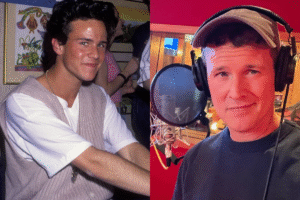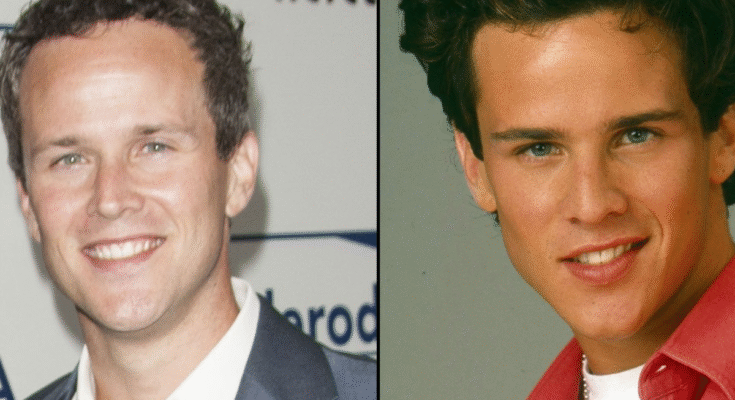The remarkable journey of Scott Eric Weinger, from beloved television boyfriend to successful writer, producer, and entertainment industry professional
Introduction: Beyond the First Love
Scott Eric Weinger’s career represents one of entertainment’s most successful transitions from teenage heartthrob to respected behind-the-scenes creative professional. Known to millions as Steve Hale, DJ Tanner’s beloved boyfriend on “Full House,” Scott’s journey took him from in front of the camera to behind it, where he has built a distinguished career as a writer and producer in television and film.
What distinguishes Scott from many former teen actors is his strategic evolution into areas of entertainment that provided both creative satisfaction and long-term career sustainability. Rather than struggling to maintain his on-screen persona as he aged, Scott recognized his strengths in writing and producing, building a successful career that has spanned decades and multiple successful projects.
His story illustrates how young performers can leverage their industry experience and relationships into different types of entertainment careers that provide stability, creativity, and professional growth. From his early success as a voice actor for Disney’s “Aladdin” to his work as a writer and producer on major television series, Scott has consistently demonstrated the intelligence and adaptability necessary for long-term success in entertainment.
Perhaps most importantly, Scott’s career demonstrates that success in entertainment doesn’t require remaining in the spotlight. His behind-the-scenes work has allowed him to contribute to projects that have entertained millions while building a sustainable career based on his talents as a storyteller and creative professional rather than just his appearance or on-screen charisma.
Chapter 1: Early Life and Acting Beginnings (1975-1990)
New York Roots and Family Foundation
Scott Eric Weinger was born on October 5, 1975, in New York City to a family that would provide him with the stability and values necessary to navigate the entertainment industry successfully. His parents, Ellen and Stephen Weinger, emphasized education, hard work, and maintaining perspective about success and fame.
Growing up in New York exposed Scott to diverse cultural experiences and provided him with an understanding of different types of performance and storytelling that would later influence his approach to writing and producing.
His family’s approach to his early career opportunities was supportive but measured, ensuring that any professional work remained balanced with education and normal childhood experiences.
The foundation of values and perspective that Scott gained from his family would prove crucial as he navigated both the opportunities and challenges that came with young success in entertainment.
Early Interest in Performance
Scott’s interest in acting and performance emerged naturally during his childhood, manifesting through school productions and local theater opportunities that allowed him to explore his creative interests.
His natural charisma and comedic timing became apparent in these early performances, demonstrating the qualities that would later make him successful in both acting and writing.
Unlike many child actors who are pushed into entertainment by ambitious parents, Scott’s involvement in performance was driven by his own interest and enjoyment of the creative process.
His early experiences in theater and performance taught him about storytelling, character development, and the collaborative nature of creative work that would inform his entire career.
Education and Development
Throughout his childhood and teenage years, Scott’s parents maintained their commitment to his education, ensuring that he received comprehensive academic preparation regardless of any professional opportunities that might arise.

His academic performance was consistently strong, demonstrating intelligence and work ethic that would later prove valuable in his writing and producing career.
The balance between education and performance opportunities taught Scott about time management and priority setting that would serve him throughout his professional life.
His educational foundation provided him with analytical and communication skills that enhanced his creative abilities and prepared him for the business aspects of entertainment work.
Move to Los Angeles
Scott’s family’s decision to relocate to Los Angeles was motivated by his growing interest in professional acting and the opportunities available in the entertainment capital.
The move to Los Angeles provided Scott with access to more significant acting opportunities while also exposing him to the business side of entertainment that would influence his later career decisions.
His adjustment to life in Los Angeles taught him about the entertainment industry’s culture and demands while his family worked to maintain the values and perspective that had characterized his upbringing.
The transition to Los Angeles marked the beginning of Scott’s serious pursuit of entertainment career while maintaining the educational and personal priorities that his family considered essential.
Chapter 2: Breakthrough Roles and Early Success (1990-1995)
Disney’s Aladdin and Voice Acting Success
One of Scott’s most significant early career achievements was being cast as the voice of Aladdin in Disney’s 1992 animated feature film. This role would provide him with a different type of fame and demonstrate his versatility as a performer beyond live-action work.
The success of “Aladdin” made Scott’s voice recognizable to millions of children and families worldwide, creating a form of celebrity that was different from traditional on-screen fame but equally valuable for his career development.
Voice acting required Scott to develop new skills in conveying emotion and personality through vocal performance alone, training that would later enhance his understanding of character development and storytelling.
The Disney association provided Scott with credibility within the entertainment industry and opened doors to other opportunities that might not have been available otherwise.
Television Opportunities and Guest Appearances
Following his success with Disney, Scott began appearing in various television shows as a guest star, gaining experience in different formats and working with diverse creative teams.
These television experiences taught him about the technical aspects of production, script development, and the collaborative processes that create successful shows.
His guest appearances demonstrated his ability to work effectively within established ensemble casts while bringing his own personality and skills to different types of characters.
The relationships he built through these television opportunities provided him with industry contacts and mentors who would prove valuable throughout his career.

Full House Casting and Steve Hale
Scott’s casting as Steve Hale on “Full House” in 1991 provided him with his most visible and career-defining role, introducing him to the massive audience that followed the popular family sitcom.
The role of Steve required Scott to portray DJ’s first serious boyfriend, a character who needed to be likable, funny, and believable as someone who could win the heart of the show’s responsible eldest daughter.
His chemistry with Candace Cameron was evident from their first scenes together, creating one of television’s most memorable teenage romance storylines that resonated with audiences of all ages.
The character of Steve allowed Scott to demonstrate both comedic and romantic acting abilities while working within the family-friendly format that defined “Full House.”
Character Development and Performance
Scott’s portrayal of Steve Hale evolved throughout his time on “Full House,” showing the character’s growth from casual boyfriend to serious romantic partner while maintaining the humor and charm that made him appealing to audiences.
His performance balanced Steve’s more immature qualities—his enormous appetite and occasional cluelessness—with genuine love and respect for DJ, creating a character who was both funny and admirable.
The storylines involving Steve and DJ’s relationship provided Scott with opportunities to explore more dramatic material while maintaining the comedic elements that characterized the show.
His work on “Full House” demonstrated his ability to maintain character consistency across multiple seasons while allowing for natural growth and development.
Industry Learning and Professional Development
Working on “Full House” provided Scott with extensive education in television production, from script development to post-production processes that would prove invaluable in his later career.
His experience working with experienced writers and producers exposed him to the creative processes behind successful television while also teaching him about the business aspects of the industry.
The collaborative environment of “Full House” allowed Scott to observe and learn from established professionals while contributing his own ideas and energy to the show’s success.
His relationships with cast and crew members provided him with mentors and industry contacts who would support his career development long after his time on the show ended.
Chapter 3: Career Transition and Behind-the-Scenes Focus (1995-2005)
Strategic Career Decisions
As “Full House” ended and Scott entered his twenties, he faced the challenge that many young actors encounter—transitioning from teenage roles to adult career opportunities while avoiding the typecasting that often limits former teen stars.
Rather than struggling to maintain his on-screen presence, Scott made the strategic decision to focus more heavily on writing and producing, recognizing that his interests and strengths lay in storytelling and creative development.

His decision to transition behind the camera was influenced by his observations during his “Full House” years about where the real creative power lay in television production and where he could build a sustainable long-term career.
This strategic thinking demonstrated maturity and self-awareness that would prove crucial to his continued success in entertainment.
Writing and Producing Development
Scott began developing his writing skills through various projects and collaborations that allowed him to explore different genres and formats while building his reputation as a creative professional.
His background as a performer provided him with unique insights into character development and dialogue that enhanced his writing abilities and made his scripts more authentic and engaging.
The relationships he had built during his acting career provided him with opportunities to work on writing projects with established producers and showrunners who could mentor his development.
His approach to learning the craft of writing was methodical and professional, treating it as a serious career path rather than just a backup option for his acting work.
Educational Pursuits
Scott’s commitment to his long-term career development included pursuing higher education that would enhance his knowledge and skills in areas relevant to his entertainment industry goals.
His academic work provided him with analytical and research skills that improved his writing while also giving him broader knowledge that enriched his creative work.
The discipline required for academic achievement while maintaining his professional activities demonstrated his work ethic and commitment to excellence in all areas of his life.
His educational experiences also provided him with perspective and life experiences outside the entertainment industry that would inform his creative work and personal development.
Early Writing Projects
Scott’s early writing projects included television episodes and development work that allowed him to apply his growing skills while building his reputation as a reliable and talented creative professional.
These projects provided him with experience in different aspects of television production while also teaching him about the business side of writing and producing.
His success in these early writing endeavors demonstrated his natural talent for storytelling and his ability to translate his performance experience into effective written content.
The positive feedback he received from colleagues and industry professionals validated his decision to focus on writing and encouraged him to continue developing his skills in this area.
Industry Networking and Relationship Building
Throughout this transition period, Scott focused on building relationships with other writers, producers, and creative professionals who could provide opportunities for collaboration and career advancement.

His reputation for professionalism and reliability, established during his acting career, served him well as he sought to build new professional relationships in his writing and producing work.
The industry contacts he developed during this period would prove crucial to his later success and would provide him with ongoing opportunities for creative collaboration.
His approach to networking emphasized genuine relationships and mutual support rather than simply seeking personal advancement, creating lasting professional bonds that enhanced his career development.
Chapter 4: Established Writing and Producing Career (2005-2015)
Major Television Projects
Scott’s transition to full-time writing and producing work culminated in his involvement with major television projects that demonstrated his skills and established his reputation as a serious creative professional.
His work on successful television series provided him with experience in all aspects of production while also giving him opportunities to mentor other writers and contribute to shows that reached millions of viewers.
The success of these projects validated his career transition and demonstrated that his talents extended far beyond his early acting work to include significant creative and business abilities.
His reputation as a reliable and talented writer-producer made him sought after for new projects and collaborations with other established professionals.
Creative Collaborations
Scott’s collaborative work with other writers and producers reflected his understanding that the best creative work often emerges from teams of talented professionals working together toward shared goals.
His ability to work effectively within writing rooms and production teams demonstrated interpersonal skills and creative flexibility that enhanced his value as a collaborator.
The relationships he built through these collaborations provided him with ongoing opportunities for new projects while also contributing to his continued learning and professional development.
His reputation as someone who contributed positively to creative environments made him a preferred collaborator for many industry professionals seeking reliable and talented team members.
Genre Exploration and Versatility
Throughout his writing and producing career, Scott demonstrated versatility by working across different genres and formats, from comedy to drama to various hybrid forms that showcased his range as a creative professional.
His willingness to explore different types of storytelling reflected both creative curiosity and strategic thinking about building a diverse portfolio of skills and experiences.
The success he achieved in different genres demonstrated that his talents were not limited to any single type of content but could be applied effectively across various forms of entertainment.
His genre versatility also provided him with career security by ensuring that he could adapt to changing industry trends and audience preferences.

Mentorship and Industry Leadership
As Scott’s career progressed, he began taking on mentorship roles with younger writers and producers, sharing his knowledge and experience while also learning from new perspectives and approaches.
His mentorship work reflected his understanding that the entertainment industry benefits from the development of new talent and that established professionals have responsibilities to support the next generation.
The respect he earned from both established colleagues and emerging talent demonstrated his effectiveness as both a creative professional and a leader within the industry.
His leadership roles in various projects provided him with experience in managing creative teams and production processes that enhanced his value as a producer and showrunner.
Financial Success and Career Security
The financial success Scott achieved through his writing and producing work provided him with career security and the freedom to choose projects based on creative interest rather than just economic necessity.
His approach to financial management and career planning demonstrated the same strategic thinking that had characterized his transition from acting to writing.
The stability he achieved allowed him to take creative risks and pursue passion projects while maintaining his professional obligations and family responsibilities.
His financial success also enabled him to support charitable causes and industry organizations that aligned with his values and interests.
Chapter 5: Current Work and Continued Success (2015-Present)
Ongoing Projects and Creative Development
Scott’s current work includes ongoing involvement in television projects that utilize his accumulated experience and expertise while also providing opportunities for continued creative growth and professional development.
His reputation as an experienced and reliable creative professional has led to opportunities to work on high-profile projects with major networks and production companies.
The consistency of his work demonstrates both his continued relevance in the entertainment industry and his ability to adapt to changing technologies and audience preferences.
His ongoing success validates his strategic career decisions and demonstrates the sustainability of behind-the-scenes careers in entertainment.
Industry Evolution and Adaptation
Scott’s ability to adapt to changes in the entertainment industry, including new technologies, distribution methods, and audience expectations, has been crucial to his continued success.
His experience across different eras of television production has given him perspective on industry changes while also providing him with skills that remain valuable regardless of technological shifts.

The evolution of his career alongside industry changes demonstrates flexibility and learning ability that have kept him relevant and effective as a creative professional.
His understanding of both traditional and contemporary approaches to entertainment production makes him valuable for projects that need to bridge different methodologies and audience expectations.
Fuller House Involvement
Scott’s participation in “Fuller House” as both actor and producer allowed him to revisit his most famous character while also demonstrating his evolved skills as a creative professional.
His dual role in the project showcased his ability to work effectively both in front of and behind the camera while contributing to a production that honored the original series while updating it for contemporary audiences.
The success of “Fuller House” validated both his acting abilities and his production skills while also providing him with opportunities to work with his original television family in new capacities.
His involvement in the project demonstrated how former child actors can successfully return to their roots while bringing new skills and perspectives to familiar material.
Personal Life and Family Balance
Scott’s approach to balancing his professional success with his personal life and family responsibilities reflects the values and perspective that have characterized his entire career.
His ability to maintain strong personal relationships while pursuing demanding professional goals demonstrates maturity and priority-setting that contribute to both personal happiness and professional effectiveness.
The stability he has achieved in his personal life provides a foundation for his creative work while also ensuring that his professional success enhances rather than conflicts with his overall life satisfaction.
His example of successful work-life balance provides a model for other entertainment industry professionals seeking to build sustainable careers without sacrificing personal well-being.
Mentorship and Industry Contribution
Scott’s continued involvement in mentoring young writers and producers reflects his commitment to contributing positively to the entertainment industry beyond his individual projects and success.
His mentorship work includes formal and informal relationships that help emerging talent develop skills and navigate the challenges of building entertainment careers.
The respect he has earned from both colleagues and mentees demonstrates his effectiveness as both a creative professional and a teacher who can share knowledge while also continuing to learn from others.
His contributions to industry organizations and educational initiatives reflect his understanding that successful professionals have responsibilities to support the overall health and development of their industries.
Conclusion: Strategic Success and Authentic Evolution
Redefining Career Success

Scott Weinger’s career demonstrates that success in entertainment can be achieved through strategic thinking, skill development, and authentic choices rather than just pursuing fame or maintaining visibility at any cost.
His transition from acting to writing and producing illustrates how young performers can leverage their industry experience into sustainable career paths that provide both creative satisfaction and financial security.
The longevity and consistency of his career prove that behind-the-scenes work can be more sustainable and fulfilling than continued attempts to maintain on-screen celebrity.
His example encourages other young performers to consider diverse career paths within entertainment rather than limiting themselves to traditional acting roles.
Creative Fulfillment and Professional Growth
Throughout his career evolution, Scott has demonstrated that creative fulfillment often comes from finding work that matches your genuine interests and abilities rather than simply continuing in familiar roles.
His success as a writer and producer reflects his willingness to develop new skills and take on different challenges rather than remaining confined to his early success as an actor.
The creative satisfaction he has achieved through writing and producing demonstrates that career transitions can lead to greater personal and professional fulfillment when they align with authentic interests and goals.
His ongoing professional development shows that entertainment careers can continue growing and evolving throughout a person’s working life when approached with strategic thinking and genuine commitment.
Industry Leadership and Influence
Scott’s evolution into industry leadership roles demonstrates how former child actors can transition into positions of real creative and business influence within entertainment.
His mentorship work and collaborative approach to creative projects have contributed to the development of other professionals and the overall quality of entertainment content.
The respect he has earned from colleagues across different areas of the entertainment industry validates his skills and contributions beyond his original fame as a teen actor.
His influence on projects and other professionals extends his impact far beyond his individual work to include contributions to the broader entertainment community.
Personal Authenticity and Values
Perhaps most importantly, Scott’s career demonstrates how personal authenticity and consistent values can guide successful career development in an industry often characterized by superficiality and compromise.
His ability to maintain his essential character and values while adapting to different roles and responsibilities shows that professional success and personal integrity can be mutually reinforcing.
The stability and satisfaction he has achieved in both his professional and personal life demonstrate that authentic choices often lead to better outcomes than decisions based solely on external expectations or short-term opportunities.
His example provides hope and guidance for others seeking to build meaningful careers in entertainment while maintaining their personal values and life priorities.
Scott Weinger’s journey from teen heartthrob to respected entertainment industry professional illustrates the power of strategic thinking, authentic choice-making, and continuous learning in building a sustainable and fulfilling career. His story reminds us that true success often comes not from maintaining early achievements but from having the wisdom and courage to evolve into roles that better match our genuine interests and abilities.



